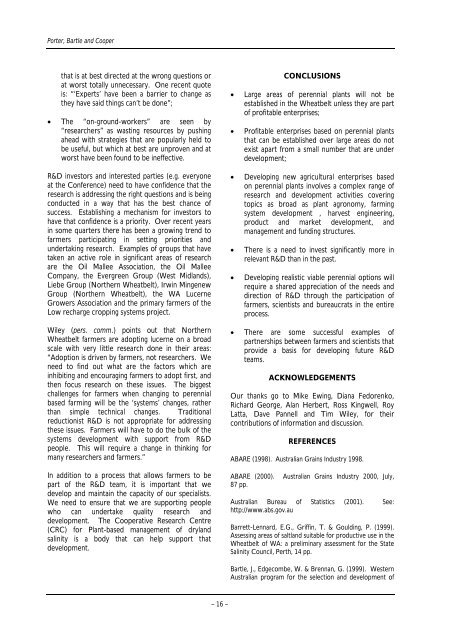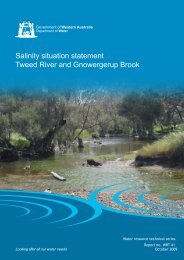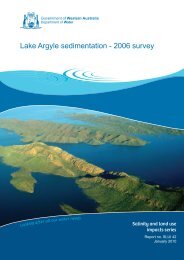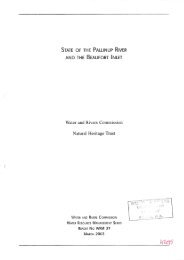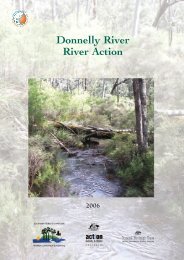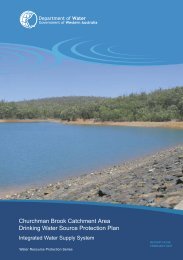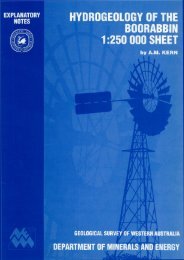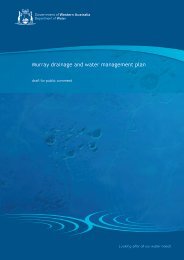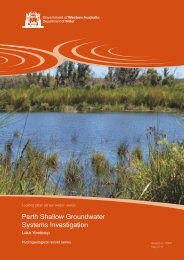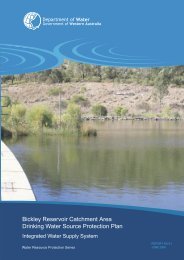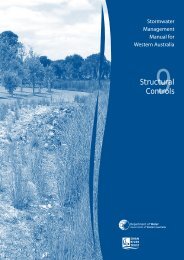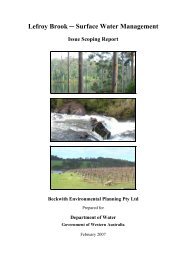Dealing with salinity in Wheatbelt Valleys - Department of Water
Dealing with salinity in Wheatbelt Valleys - Department of Water
Dealing with salinity in Wheatbelt Valleys - Department of Water
You also want an ePaper? Increase the reach of your titles
YUMPU automatically turns print PDFs into web optimized ePapers that Google loves.
Porter, Bartle and Cooper<br />
that is at best directed at the wrong questions or<br />
at worst totally unnecessary. One recent quote<br />
is: “‘Experts’ have been a barrier to change as<br />
they have said th<strong>in</strong>gs can’t be done”;<br />
• The “on-ground-workers” are seen by<br />
“researchers” as wast<strong>in</strong>g resources by push<strong>in</strong>g<br />
ahead <strong>with</strong> strategies that are popularly held to<br />
be useful, but which at best are unproven and at<br />
worst have been found to be <strong>in</strong>effective.<br />
R&D <strong>in</strong>vestors and <strong>in</strong>terested parties (e.g. everyone<br />
at the Conference) need to have confidence that the<br />
research is address<strong>in</strong>g the right questions and is be<strong>in</strong>g<br />
conducted <strong>in</strong> a way that has the best chance <strong>of</strong><br />
success. Establish<strong>in</strong>g a mechanism for <strong>in</strong>vestors to<br />
have that confidence is a priority. Over recent years<br />
<strong>in</strong> some quarters there has been a grow<strong>in</strong>g trend to<br />
farmers participat<strong>in</strong>g <strong>in</strong> sett<strong>in</strong>g priorities and<br />
undertak<strong>in</strong>g research. Examples <strong>of</strong> groups that have<br />
taken an active role <strong>in</strong> significant areas <strong>of</strong> research<br />
are the Oil Mallee Association, the Oil Mallee<br />
Company, the Evergreen Group (West Midlands),<br />
Liebe Group (Northern <strong>Wheatbelt</strong>), Irw<strong>in</strong> M<strong>in</strong>genew<br />
Group (Northern <strong>Wheatbelt</strong>), the WA Lucerne<br />
Growers Association and the primary farmers <strong>of</strong> the<br />
Low recharge cropp<strong>in</strong>g systems project.<br />
Wiley (pers. comm.) po<strong>in</strong>ts out that Northern<br />
<strong>Wheatbelt</strong> farmers are adopt<strong>in</strong>g lucerne on a broad<br />
scale <strong>with</strong> very little research done <strong>in</strong> their areas:<br />
“Adoption is driven by farmers, not researchers. We<br />
need to f<strong>in</strong>d out what are the factors which are<br />
<strong>in</strong>hibit<strong>in</strong>g and encourag<strong>in</strong>g farmers to adopt first, and<br />
then focus research on these issues. The biggest<br />
challenges for farmers when chang<strong>in</strong>g to perennial<br />
based farm<strong>in</strong>g will be the ‘systems’ changes, rather<br />
than simple technical changes. Traditional<br />
reductionist R&D is not appropriate for address<strong>in</strong>g<br />
these issues. Farmers will have to do the bulk <strong>of</strong> the<br />
systems development <strong>with</strong> support from R&D<br />
people. This will require a change <strong>in</strong> th<strong>in</strong>k<strong>in</strong>g for<br />
many researchers and farmers.”<br />
In addition to a process that allows farmers to be<br />
part <strong>of</strong> the R&D team, it is important that we<br />
develop and ma<strong>in</strong>ta<strong>in</strong> the capacity <strong>of</strong> our specialists.<br />
We need to ensure that we are support<strong>in</strong>g people<br />
who can undertake quality research and<br />
development. The Cooperative Research Centre<br />
(CRC) for Plant-based management <strong>of</strong> dryland<br />
<strong>sal<strong>in</strong>ity</strong> is a body that can help support that<br />
development.<br />
– 16 –<br />
CONCLUSIONS<br />
• Large areas <strong>of</strong> perennial plants will not be<br />
established <strong>in</strong> the <strong>Wheatbelt</strong> unless they are part<br />
<strong>of</strong> pr<strong>of</strong>itable enterprises;<br />
• Pr<strong>of</strong>itable enterprises based on perennial plants<br />
that can be established over large areas do not<br />
exist apart from a small number that are under<br />
development;<br />
• Develop<strong>in</strong>g new agricultural enterprises based<br />
on perennial plants <strong>in</strong>volves a complex range <strong>of</strong><br />
research and development activities cover<strong>in</strong>g<br />
topics as broad as plant agronomy, farm<strong>in</strong>g<br />
system development , harvest eng<strong>in</strong>eer<strong>in</strong>g,<br />
product and market development, and<br />
management and fund<strong>in</strong>g structures.<br />
• There is a need to <strong>in</strong>vest significantly more <strong>in</strong><br />
relevant R&D than <strong>in</strong> the past.<br />
• Develop<strong>in</strong>g realistic viable perennial options will<br />
require a shared appreciation <strong>of</strong> the needs and<br />
direction <strong>of</strong> R&D through the participation <strong>of</strong><br />
farmers, scientists and bureaucrats <strong>in</strong> the entire<br />
process.<br />
• There are some successful examples <strong>of</strong><br />
partnerships between farmers and scientists that<br />
provide a basis for develop<strong>in</strong>g future R&D<br />
teams.<br />
ACKNOWLEDGEMENTS<br />
Our thanks go to Mike Ew<strong>in</strong>g, Diana Fedorenko,<br />
Richard George, Alan Herbert, Ross K<strong>in</strong>gwell, Roy<br />
Latta, Dave Pannell and Tim Wiley, for their<br />
contributions <strong>of</strong> <strong>in</strong>formation and discussion.<br />
REFERENCES<br />
ABARE (1998). Australian Gra<strong>in</strong>s Industry 1998.<br />
ABARE (2000). Australian Gra<strong>in</strong>s Industry 2000, July,<br />
87 pp.<br />
Australian Bureau <strong>of</strong> Statistics (2001). See:<br />
http://www.abs.gov.au<br />
Barrett-Lennard, E.G., Griff<strong>in</strong>, T. & Gould<strong>in</strong>g, P. (1999).<br />
Assess<strong>in</strong>g areas <strong>of</strong> saltland suitable for productive use <strong>in</strong> the<br />
<strong>Wheatbelt</strong> <strong>of</strong> WA: a prelim<strong>in</strong>ary assessment for the State<br />
Sal<strong>in</strong>ity Council, Perth, 14 pp.<br />
Bartle, J., Edgecombe, W. & Brennan, G. (1999). Western<br />
Australian program for the selection and development <strong>of</strong>


